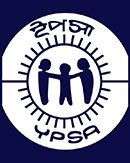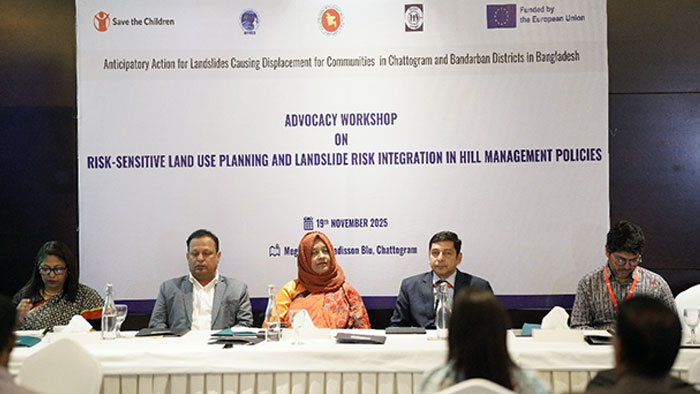An impactful Advocacy Workshop on Risk-Sensitive Land Use Planning and Landslide Risk Integration in Hill Management Policies was successfully hosted on , November 19, 2025 at the Radisson Blu Hotel, Chattogram. Organized by YPSA, RIMES, and Save the Children, and funded by the European Civil Protection and Humanitarian Aid Operations (ECHO), the project aimed at strengthening preparedness and early warning systems in the landslide-prone Chattogram Hill Tracts.
Government Emphasizes Managing Hills in Chattogram Division by Nature-Based Solution.
— Dr. Muhammad Ziauddin, Divisional Commissioner, Chattogram
The workshop was chaired by Nusrat Sultana, Additional Commissioner (Development), Office of the Divisional Commissioner, Chattogram. The chief guest was Dr. Muhammad Ziauddin, Divisional Commissioner, Chattogram.
Special guests included Md. Ashraful Amin, Acting Chief Executive Officer and Secretary, Chattogram City Corporation; Md. Ridwan Hossain, Additional Commissioner (Development), Office of the Divisional Commissioner, Chattogram; Professor Dr. Muhammad Muhibbullah, Department of Geography & Environmental Studies, University of Chittagong; Associate Professor Dr. Israat Jahan, Department of Urban & Regional Planning, Chittagong University of Engineering and Technology (CUET); Kamal Hossain, Assistant Urban Planner, CDA; representatives of various government departments; Abdur Rahman Khan, Deputy Director, Bangladesh Disaster Management, Chattogram; representatives from development organizations; journalists; and representatives of landslide-prone communities, including the Chairman of Sadharpur Union Parishad and the Panel Chairman of Pukuria Union, Banshkhali.
The welcome speech and an overview of YPSA’s activities were presented by Nasim Banu Shyamoli, Director (Social Development), YPSA. A presentation on the workshop summary, program activities, and project progress was delivered by Mr. Saimon Rahman, Senior Manager, Save the Children Bangladesh. The workshop was inaugurated by Nusrat Sultana, Additional Commissioner (Development).
A presentation on early warning for landslides was delivered by Abdur Rahman Khan, Deputy Director, Bangladesh Disaster Management, Chattogram. A presentation on project activities and progress was delivered by Md. Abu Tayeb, Senior Officer, Save the Children, and Asif Uddin Bin Nur, RIMES.
Another key presentation—an analysis of existing hill management policies and policy gaps—was presented by Professor Dr. Akhtar Mahmud, Department of Urban and Regional Planning, Jahangirnagar University. Dr. Mahmud highlighted risk-sensitive land use planning, disaster risks in urban Bangladesh, an overview of various hazards, a brief scenario of landslide incidents, socio-economic, environmental, and political dimensions of landslides, and the importance of hill management policy.
Through open dialogue, expert presentations (including a Keynote by Professor Md. Akter Mahmud, PhD), and group discussions, participants reached a shared understanding of the urgent need to integrate risk-sensitive land use planning and displacement considerations into existing hill management policies.
The workshop successfully generated a draft set of policy recommendations and actionable steps to guide risk-sensitive land use planning and anticipatory action. Overall, the workshop served as a critical step toward enhancing coordinated governance, promoting sustainable hill management practices, and protecting vulnerable populations from landslide-induced hazards.
During his remarks as Special Guest, Md. Ashraful Amin, Acting CEO and Secretary, Chattogram City Corporation, stated that the City Corporation is introducing a new app for disaster management. This app will help with early warning awareness as well as reporting complaints and irregularities, enabling immediate action.
As the chief guest, Dr. Muhammad Ziauddin, Divisional Commissioner, Chattogram, stated:
“We have contradictory policies, and because of that, we often lose our direction. The main reason behind this seems to be the population explosion, which leads to constant pressure for new policies for people’s needs. To create effective policies, we need research. Research should identify real problems. But we often fail to use research outcomes—because many researchers conduct studies only to obtain certificates, not to solve problems.
However, the hopeful part is that we are now working together, thinking collectively, and making decisions collectively. The government is planning to construct multi-storey buildings in Chattogram without cutting hills, preserving nature, similar to the way the British built their bungalows and administrative offices in this region. The Ministry of Public Works has already given initial approval. Due to strong administrative vigilance this year, landslide risks were managed effectively, and no major disaster occurred. Zero tolerance on hill cutting helped reduce damage significantly.”
In her concluding remarks, the Chair, Nusrat Sultana, highlighted the need to allow nature to remain in its original state. She stressed the importance of adopting plans that align with this principle. She mentioned the ongoing lack of coordination and accountability in various sectors. Issues related to electricity and water supply in hill areas were raised during discussions, which, she emphasized, require the involvement of the Bangladesh Power Development Board.
She also noted that often we avoid taking responsibility for our actions, leading to gaps in performing our duties. She urged the need for systematic approaches from research to policy implementation so that real solutions can be achieved.



